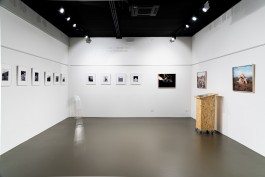Exhbition:
'Sei un animale'
David Chancellor, Giulia Degasperi, Andrej Kondratyev
Febbraio, 2025
The latest exhibition at Lab27, "Sei un animale" ("You Are an Animal") offers glimpses into the understanding of the relationship with heterotrophic life forms closely related to humans. Featured by photographer David Chancellor one of the most dedicated and committed observers of African wildlife. Alongside his works, a selection by Giulia Degasperi, drawn from a long documentary about pastoral life in the Trentino Alps, and portraits of Kazakh fishermen by Kyrgyz photographer Aleksey Kondratyev.
Human fascination with nature, including through photography, has been a constant throughout our evolutionary history. Early representations and cave paintings often depict animals and, at times, hunting scenes. The etymology of the word animal contains anima, which refers to the life force, the breath that connects us organically to the world and animates existence. An animal is something animated, and thus humans can also be considered animals. However, not in a "zoo," a term from Greek that specifically denotes distinction rather than similarity. It is this intellectual distinction, separating humans from other living beings, that fuels the development of an anthropocentric culture, placing humans at the top of the organic life hierarchy, reducing it to raw material—canned meat, or whatever else one may wish to call it.














Exhbition:
'Sei un animale'
David Chancellor, Giulia Degasperi, Andrej Kondratyev
Febbraio, 2025
The latest exhibition at Lab27, "Sei un animale" ("You Are an Animal") offers glimpses into the understanding of the relationship with heterotrophic life forms closely related to humans. Featured by photographer David Chancellor one of the most dedicated and committed observers of African wildlife. Alongside his works, a selection by Giulia Degasperi, drawn from a long documentary about pastoral life in the Trentino Alps, and portraits of Kazakh fishermen by Kyrgyz photographer Aleksey Kondratyev.
Human fascination with nature, including through photography, has been a constant throughout our evolutionary history. Early representations and cave paintings often depict animals and, at times, hunting scenes. The etymology of the word animal contains anima, which refers to the life force, the breath that connects us organically to the world and animates existence. An animal is something animated, and thus humans can also be considered animals. However, not in a "zoo," a term from Greek that specifically denotes distinction rather than similarity. It is this intellectual distinction, separating humans from other living beings, that fuels the development of an anthropocentric culture, placing humans at the top of the organic life hierarchy, reducing it to raw material—canned meat, or whatever else one may wish to call it.














